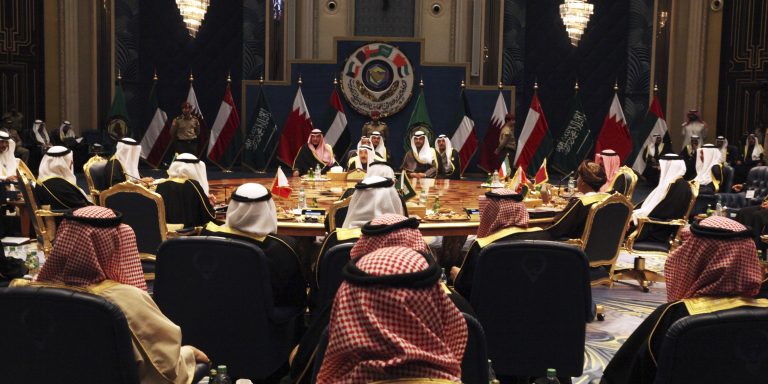INTELBRIEF
September 15, 2020
IntelBrief: Gulf States Facing Economic Challenges

Bottom Line up Front
- The COVID-19 pandemic has exposed the continuing dependence of the Arab monarchies of the Persian Gulf on hydrocarbon exports.
- The fall in prices of oil and gas exports is forcing the Gulf states to cut spending, sell government bonds, draw down on their sovereign wealth funds, and send many expatriates home.
- Gulf state economic difficulties are spilling over into the poorer Arab states that depend on their economic support.
- The economic pressure on the Gulf states could complicate U.S. efforts to enhance the Gulf states’ ability to counter Iran.
The six Arab monarchies of the Persian Gulf, linked in a strained alliance called the Gulf Cooperation Council (GCC: Saudi Arabia, Kuwait, United Arab Emirates, Qatar, Bahrain, and Oman) are widely thought of as ‘oil-rich states,’ but their dependence on energy exports has rendered them vulnerable to the economic effects of the COVID-19 pandemic. The global economic weakness caused by the pandemic has exposed the inability of the GCC states, to date, to adequately diversify their economies. All of the GCC states have sought to diversify by promoting tourism, financial services, some light industry, and even agriculture, but energy exports still provide a majority of their government revenues and large percentages of their gross domestic product (GDP).
To cope with the downturn, the GCC states have been compelled to take steps that risk public resentment and set back efforts to reduce their future susceptibility to sharp energy price fluctuations. Some GCC countries have cut back on the generous subsidies and other benefits that their citizens demand. To create jobs for their own citizens, the Gulf states have urged many expatriates – who constitute the bulk of the labor force in several of them – to return home. The Kuwaiti government lacks available funds to pay its civil servants beyond October 2020 and will have to sell assets from its large sovereign wealth fund to make up the shortfall. Kuwait’s ‘Fund for Future Generations,’ and similar sovereign wealth funds maintained by Saudi Arabia, the UAE, and Qatar, are intended to maintain prosperity when hydrocarbon exports eventually diminish. Drawing down those asset balances could compromise future economic security. Some of the Gulf states have opted instead to sell government bonds rather than draw on invested capital, but doing so will require interest payments. Because the Saudi government budget depends on dividend payments from the highly profitable Saudi Aramco, the energy behemoth has had to take on debt and postpone some long-term strategic investments such as petrochemical plants in the United States, a refinery in China, and liquefied natural gas infrastructure projects.
The economic difficulties could also compel the GCC states to rein in their financial generosity, an outcome that would deepen the economic and political struggles in the region and beyond. The wealthiest GCC states - Saudi Arabia, Kuwait, UAE, and Qatar - have been major donors to some of the poorer states in the region, as well as to disaster relief operations around the world. In 2018-19, Saudi Arabia, Kuwait, and the UAE jointly provided $10 billion economic stabilization packages to Jordan, which hosts millions of refugees from the region’s various conflicts, as well as to one of the least wealthy GCC states, Bahrain, which has experienced unrest among the majority Shia Arab population since 2011. Although it is not following the UAE and Bahrain in announcing the normalization of relations with Israel, Qatar funds large humanitarian relief projects in the Gaza Strip as part of an Israeli-backed effort to incentivize Palestinian Hamas not to clash with Israel. The GCC states have provided some funds to Lebanon in the wake of the devastating Beirut port explosion of early August. But GCC financial difficulties, coupled with their intent to isolate Iran’s ally, Lebanese Hezbollah, have thus far prevented the GCC states from saving Lebanon from the broader financial crisis that predates the port blast.
The budgetary pressure on the Gulf states could also complicate U.S. strategic planning to counter Iran and ultimately offload more of the Gulf security burden. The United States has pressed the GCC states to establish a coordinated missile defense - interoperable with U.S. systems - to counter Iran’s growing missile capabilities. The U.S.-made Terminal High Altitude Area Defense (THAAD) system, the sale of which to the GCC states is key to that plan, might be prohibitively expensive in the current economic climate, at a cost of over $10 billion. The UAE bought that system before the pandemic, and it currently seeks to buy the advanced F-35 Joint Strike Fighter, but the other GCC states appear to be limiting large new weapons orders in light of their budget shortfalls. Meanwhile, despite intensive U.S. sanctions, Iran’s indigenous weapons production capability continues to advance.